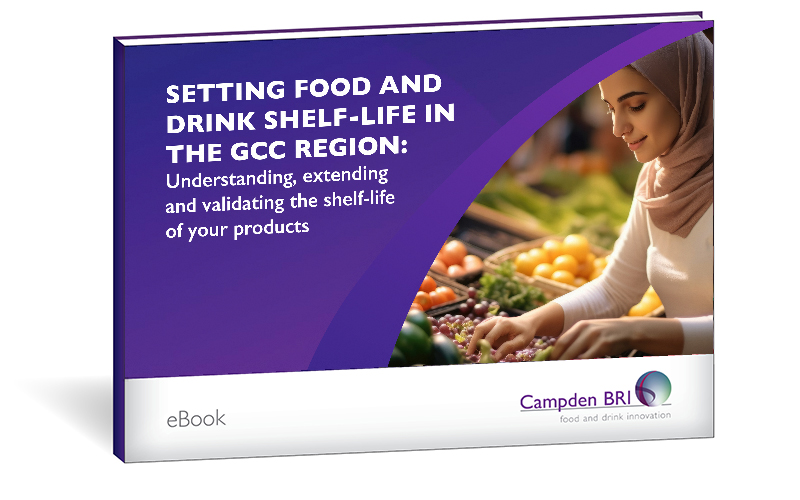
Understanding and setting food and drink shelf-life in the GCC region
19 February 2024 | Houaida Alawieh, Senior Regulatory Advisor, GCC Lead
What are GCC and GSO?
The Gulf Cooperation Council (GCC) region comprises six member states: Bahrain, Kuwait, Oman, Qatar, Saudi Arabia, and the United Arab Emirates. The Gulf Standardisation Organisation (GSO) is an essential entity within the GCC region; it is the primary authority responsible for standardisation and regulatory initiatives across various sectors, including the food industry.
In the context of food regulation, GSO plays a central role in harmonising standards and establishing guidelines to ensure the safety, quality and conformity of food products circulating in the GCC market. GSO develops and implements standardised protocols, encompassing labelling, production, expiration dates, packaging, and many other critical aspects of food safety and quality control.
One of GSO's fundamental objectives is to unify regulations and practices among member states, fostering consistency and coherence in food standards across borders. This harmonisation effort aims to facilitate the free movement of goods within the GCC, whilst upholding stringent safety and quality benchmarks.
What does GSO do?
GSO's regulatory influence extends to formulating mandatory standards that serve as crucial reference points for manufacturers, exporters, distributors and retailers. The aim of these is to ensure compliance with unified guidelines and to foster consumer trust by facilitating the flow of transparent, accurate and consistent information through the food chain for communication on food products and their labels.
Additionally, GSO actively collaborates with relevant stakeholders, including governmental bodies, industry experts and international organisations, to continuously review, update and enhance its technical regulations. By engaging in research, conducting risk assessments and promoting best practices, GSO contributes significantly to advancing the GCC region's food safety and quality assurance measures.
Overall, GSO's role in the GCC's food regulatory landscape is pivotal, as it acts as the driving force behind standardisation efforts, ensuring that food products meet stringent safety and quality criteria while harmonising regulations across member states for the benefit of consumers, businesses and the broader marketplace as a whole.
How do you set food and drink shelf-life in the GCC?
In the GCC region, the determination of expiration periods for food products is a regulated aspect overseen by the regional and national authorities responsible for food safety. Within the GCC's regulatory framework, there is a mandatory standard, namely GSO 150-1:2013 ‘Expiration dates for food products-Part 1: Mandatory expiration dates’ and its subsequent amendments, which outlines specific food categories, alongside GSO 150-2:2013 ‘Expiration dates for food products-Part 2: Voluntary expiration dates’ and its amendments, which offers guidance for other food categories or similar products stored under different temperature conditions than those specified in GSO 150-1:2013.
Manufacturers encounter various complexities in maintaining adherence to shelf-life regulations in the GCC. The main challenges are the mandatory nature of the GSO standards, which set mandatory expiration periods for various categories of food products, and the GCC's extreme temperatures and high humidity, which can significantly impact storage, transportation and product stability.
Download our FREE Setting food and drink shelf-life in the GCC region eBook

Can I extend shelf-life beyond GSO standards while ensuring compliance?
Whilst the GSO standards set out mandatory expiration periods for various categories of food products in the GCC region, the regulatory authorities may accept a different / longer shelf-life, so long as this has been scientifically proven to be appropriate and safe for the product in question.
Given the mandatory nature of the GSO shelf-life standards and the paramount importance of compliance, regulatory authorities may approve a different or longer shelf-life if scientifically demonstrated to be suitable and safe for the product in question.
As such, manufacturers of food products for the GCC market may seek to gather scientific data, to present to relevant national or regional regulatory authorities, advocating for an extended shelf-life based on thorough research and analysis.
For more information and support with understanding, setting, extending and validating food and drink product shelf-life for the GCC region, download and read our eBook.
How can Campden BRI help?
We provide tailored, expert support in all areas of shelf-life evaluation, maximisation and extension, and have specific expertise in microbiology, chemistry, sensory, regulatory and product innovation services. We work extensively helping manufacturers in defining the best date mark type to use, maximising shelf-life so that products are economic to produce and less likely to become waste, and ensuring the safety of these products for consumers.
We are therefore best placed to assist with the collation of the scientific evidence required to support an application to use a product shelf-life that is more than that set out in the GSO standards. We can help back up shelf-lives with required data to ensure food and beverage products have a long life whilst remaining safe to consume.
لماذا تختار Campden BRI؟
نحن نقدم نصائح علمية مخصصة في جميع مجالات تقييم العمر الافتراضي وتحسينه وتمديده، ونمتلك خبرة محددة في علم الأحياء الدقيقة والكيمياء والخدمات الحسية والتنظيمية وابتكار المنتجات. نحن نعمل على نطاق واسع لمساعدة الشركات المصنعة في تحديد أفضل تاريخ صلاحية للأغذية، وزيادة مدة الصلاحية إلى أقصى حد بحيث تكون المنتجات اقتصادية للإنتاج وأقل عرضة للتلف، وضمان سلامة هذه المنتجات للمستهلكين.
لذلك نحن أفضل خيار للمساعدة في تجميع الأدلة العلمية المطلوبة لدعم طلب استخدام مدة صلاحية المنتج التي تزيد عن تلك المنصوص عليها في المواصفات القياسية في الحالات المناسبة. يمكننا أيضاً المساعدة في دعم المعلومات المتعلقة بمدة الصلاحية من خلال استخدام البيانات المطلوبة لضمان عمر طويل لمنتجات الأغذية والمشروبات مع الحفاظ على سلامتها للاستهلاك.
تواصلوا معنا اليوم إن كنتم بحاجة لأي دعم يتعلق بتحديد مدة صلاحية الطعام والمشروبات في منطقة دول مجلس التعاون الخليجي.
Setting food and drink shelf-life in the GCC region: Understanding, extending and validating the shelf-life of your products
Download our FREE eBook to learn more.
Need regulatory support?
Our experienced team of regulatory experts can help you ensure that your products are compliant with the legislative requirements of your target market.






